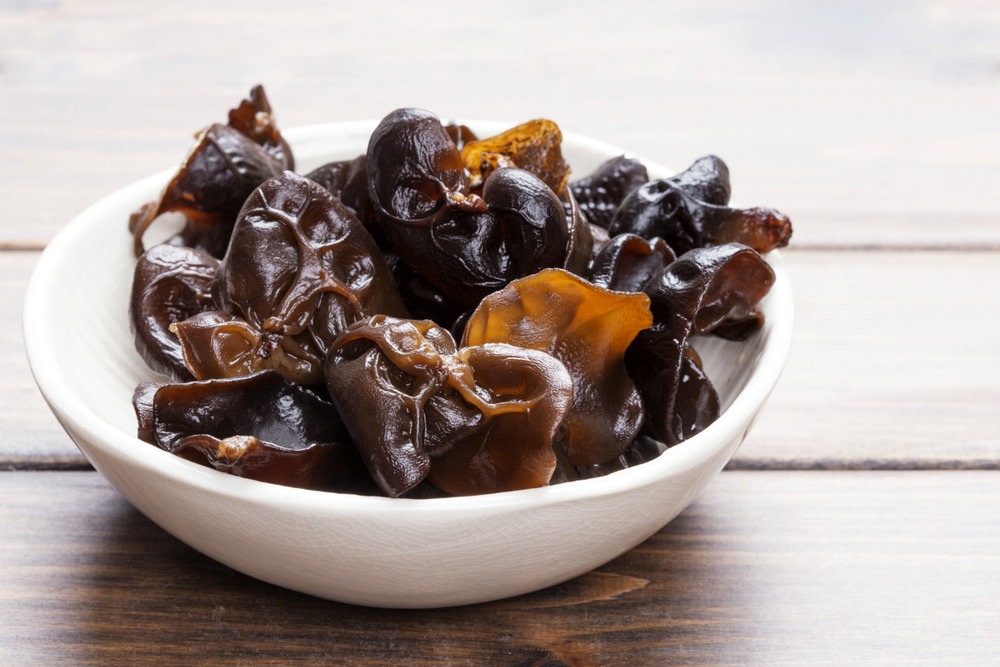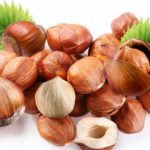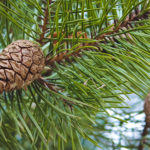Amazing Black Fungus Benefits
Over the years, black fungus benefits have been helpful because black fungus (Auricularia auricula) has been a staple of traditional Chinese medicine for centuries.
The genus Auricularia includes 10-15 recognized species worldwide, many of which are similar. Black fungi are also commonly known as tree ears due to their resemblance to the human ear. These dark black and brown mushrooms have a crunchy texture when fresh and a very hard texture when dried.
The taste is comparable to oysters and shiitake mushrooms. They are closely related to fog ear fungi (Auricularia polytricha) and jellyfish ear fungi.
Black fungus nutritional value
– 100 g of black mushroom contains 14.8 g of water and 284 kcal of energy.
– 9.25 grams of protein
– 0.73 grams of fat
– 73.01 grams of carbohydrates
– 70.1 grams of dietary fiber
– Calcium 159 mg
– 5.88 mg iron
– Magnesium 83 mg
– Phosphorus 184 mg
– Potassium 754 mg
– 35 mg sodium
– 1.32 mg zinc
– 0.183 mg copper
– Manganese 1.951 mg
– 43.4 μg selenium
Black Fungus Benefits
Black fungus has many impressive benefits, some of which may include plausible positive effects on circulation, heart health, and chronic disease.
May help improve blood circulation
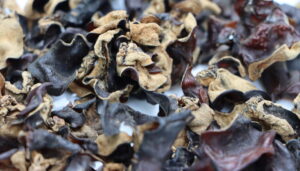
Known for its potentially high iron content, black fungus is a popular potential remedy for relieving symptoms of anemia. One of the black fungus benefits is that, it is thought to be rich in iron, proteins, vitamins and polysaccharides.
The terpenoids in this mushroom are said to help allergy sufferers by inhibiting antigenic activity.
May help reduce inflammation
The potentially high levels of polysaccharides found in these types of mushrooms have several medicinal benefits.
In essence, preventing inflammation that can occur, especially in mucosal tissues, and may inhibit key enzymes that may contribute to Alzheimer’s disease is another one among black fungus benefits.
May help improve heart health
The polysaccharides found in this type of mushroom can lower blood cholesterol and triglyceride levels. They also inhibit platelet aggregation and regulate blood viscosity to reduce the risk of heart disease and stroke.
Regarding black fungus benefits, it may act as a potential anticoagulant. This mushroom can be used to relieve high blood pressure, blood clots, and thrombosis.
Potential antioxidant properties
Vitamin B2 in black mold acts as a powerful antioxidant, protecting cells from free radicals and potentially reducing the risk of chronic disease. It may also have a positive effect on physical stress and support a healthy immune system.
It can detox the body
This fungus can act as an antidote and is often combined with potentially mildly toxic foods to potentially reduce the effects of pesticides and heavy metal residues. It is thought that it may absorb impurities from the lungs and digestive system, weakening the effects of radiation and chemotherapy.
Black Fungus Helps with weight loss
The pectin and fiber in this edible mushroom are thought to prevent obesity and promote weight loss by inhibiting fat absorption.
Packed with Powerful Antioxidants
Mushrooms, including mushroom seeds, are generally rich in antioxidants. These beneficial plants help fight oxidative stress in the body associated with inflammation and many diseases.
Additionally, mushrooms often contain powerful polyphenolic antioxidants. A diet high in polyphenols is associated with a lower risk of chronic diseases such as cancer and heart disease
May Promote Gut and Immune Health
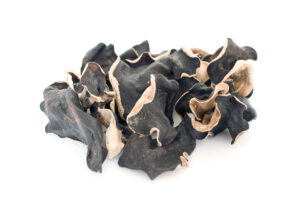
Like many other mushrooms, black mold contains prebiotics – primarily in the form of beta-glucan.
Prebiotics are a type of fiber that nourishes the gut microbiome, or friendly bacteria in the gut. These promote digestive health and maintain intestinal regularity
Interestingly, the gut microbiota is closely associated with immune system health.
The prebiotics in black mold are thought to boost the immune response against unwanted pathogens that can cause disease.
Black fungus can lower cholesterol levels
The polyphenols in mushrooms help lower LDL (bad) cholesterol. Lowering LDL cholesterol can reduce the risk of heart disease. A study of rabbits fed wood fungus found that both total and LDL (bad) cholesterol were significantly reduced.
Still, researchers aren’t sure exactly how the fungus exerted this effect, and a single animal study of wood ears doesn’t necessarily apply to people who eat black fungi.
May Promote Brain Health
Mushrooms are believed to maintain healthy brain function. Test-tube studies have found that fungi and other fungi inhibit the activity of beta-secretase, the enzyme that releases beta-amyloid protein. These proteins are toxic to the brain and have been linked to degenerative diseases such as Alzheimer’s disease.
Although these results are promising, human studies are needed. It can protect the liver. Black mold can protect the liver from damage caused by certain substances.
In a study in rats, a solution of water and black mushroom powder helped protect the liver from damage caused by an overdose of acetaminophen, often marketed as Tylenol in the United States. Researchers have linked this effect to mushrooms‘ powerful antioxidant properties. However, research is lacking.
Side effects
Black mold should be consumed with caution if you have any of the following health problems:
Blood clotting: Patients taking medications for blood disorders should not take black mold as it may interfere with clotting. Stop taking black mold at least two weeks before scheduled surgery.
Pregnancy: Women who are pregnant or breastfeeding should not use this mushroom in any form as it may harm the baby.

A graduate of Computer Science and Information Management Technology. Diploma – Caregiving, Certificates – Dementia and Diabetes Awareness and Management. A researcher, blogger, songwriter, singer and acoustic guitarist. Born in an environment where natural talents such as healing are imparted at our natural birth. This natural talents of healing is the result of our genetic inheritance and the training from family environment.







